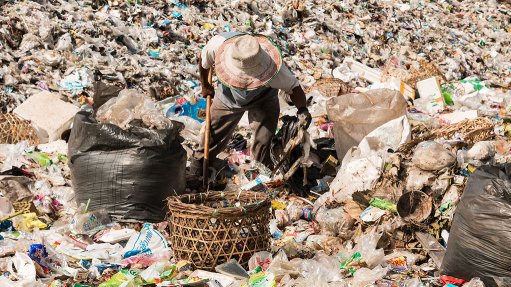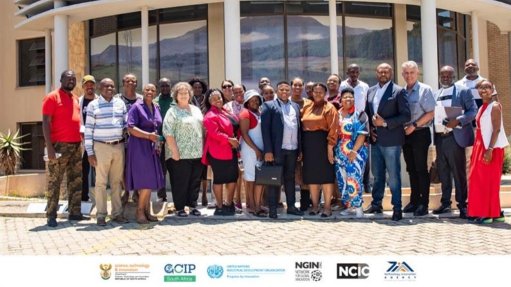Engineering services help maintain mine profits
The biggest threat to a sustainable water supply in South Africa is not the lack of storage, but the contamination of limited available water resources, says extractive metallurgy company Multotec environmental process engineer CJ Liebenberg.
This takes place through mining pollution and acid mine drainage (AMD), industrial pollution, wastewater treatment works discharge, raw municipal waste discharge, urban runoff, irrigation return flow and aerial deposition,
To counter these problems, Multotec recently launched a water treatment and metals recovery solutions and services division in partnership with Australia-based company Clean TeQ.
Liebenberg says that the introduction of continuous ion filtration (CIF) will have significant benefits for the local industry as a whole.
“CIF is based on the foundation of IX technology, which has been on the market for more than 50 years. It can be likened to continuous sand filtration, the salient differences being that, in CIF, charged resins are used as filtration media instead of sand, and in addition to removing suspended solids, CIF also filters dissolved salts out of the solution,” he says.
Clean TeQ has developed three main processes based on CIF. These are single- stage CIF for resource recovery and dealkalisation applications, dual-stage CIF for desalination of water and high-recovery reverse osmosis (RO), and desalination using CIF on the front end of RO to remove scaling, improving the overall performance of RO, and reusing RO brine for resin regeneration for a chemical-free membrane system. All three systems can be adapted to produce a zero liquid discharge process.
The main features of CIF include a resin-cleaning step to enable the system to operate in the presence of suspended solids, counter-current flow of aqueous and resin phases for high efficiency ion exchange and that there are minimal moving parts and no complicated internal structures, explains Leibenberg.
The plants can be containerised and be fully automated with remote access. These features enable robustness of the system to treat solutions with high scaling potential, he adds.
Liebenberg says that the CIF technology complements the other products and services in Multotec’s portfolio. “Multotec’s core business revolves around the supply of products and services to the mining and mineral beneficiation industries, including solid/liquid separation units such as centrifuges and filter presses. Our aim with CIF is to assist in the alleviation of water shortage issues and to encourage sustainable development in South Africa. Mining is often regarded as being a nonsustainable enterprise and we intend to be part of the solution.”
Liebenberg highlights that water recoveries of more than 95% have been realised using this system and production of either agricultural-grade or ultrapure water with total dissolved solids concentration less than 50 mg/ℓ is a reality.
The plant has minimal pretreatment requirements, uses inexpensive chemicals for regeneration and has low power requirements, all of which contribute to lower capital and operating costs, compared with competing technologies, he says.
Further, mobility of the CIF enables water treatment in remote locations and the automated system enables operation independently and remote control. Its simplicity facilitates ease of operation and maintenance, eliminating the need for highly skilled labour. Potential by-products in a saleable form, such as gypsum, can be produced, notes Liebenberg.
The IX technology enables CIF to treat water originating from numerous sources, and to remove a wide range of contaminants at various concentrations. Niche markets identified for CIF include water treatment in the AMD, mine process and effluent water, groundwater and agricultural sectors using containerised systems, although not excluding requests for modular CIF plants and prospects for CIF in emerging markets.
The technology has had significant success in the treatment of coal seam gas- (CSG-) associated water in Australia, says Liebenberg.
With government having given the green light for exploration of offshore subsurface exploitation of natural gas in the Karoo, as well as other indications that CSG exploitation might take place in Southern Africa, there is significant potential for CIF in the future, he concludes.
Article Enquiry
Email Article
Save Article
Feedback
To advertise email advertising@creamermedia.co.za or click here
Announcements
What's On
Subscribe to improve your user experience...
Option 1 (equivalent of R125 a month):
Receive a weekly copy of Creamer Media's Engineering News & Mining Weekly magazine
(print copy for those in South Africa and e-magazine for those outside of South Africa)
Receive daily email newsletters
Access to full search results
Access archive of magazine back copies
Access to Projects in Progress
Access to ONE Research Report of your choice in PDF format
Option 2 (equivalent of R375 a month):
All benefits from Option 1
PLUS
Access to Creamer Media's Research Channel Africa for ALL Research Reports, in PDF format, on various industrial and mining sectors
including Electricity; Water; Energy Transition; Hydrogen; Roads, Rail and Ports; Coal; Gold; Platinum; Battery Metals; etc.
Already a subscriber?
Forgotten your password?
Receive weekly copy of Creamer Media's Engineering News & Mining Weekly magazine (print copy for those in South Africa and e-magazine for those outside of South Africa)
➕
Recieve daily email newsletters
➕
Access to full search results
➕
Access archive of magazine back copies
➕
Access to Projects in Progress
➕
Access to ONE Research Report of your choice in PDF format
RESEARCH CHANNEL AFRICA
R4500 (equivalent of R375 a month)
SUBSCRIBEAll benefits from Option 1
➕
Access to Creamer Media's Research Channel Africa for ALL Research Reports on various industrial and mining sectors, in PDF format, including on:
Electricity
➕
Water
➕
Energy Transition
➕
Hydrogen
➕
Roads, Rail and Ports
➕
Coal
➕
Gold
➕
Platinum
➕
Battery Metals
➕
etc.
Receive all benefits from Option 1 or Option 2 delivered to numerous people at your company
➕
Multiple User names and Passwords for simultaneous log-ins
➕
Intranet integration access to all in your organisation


















